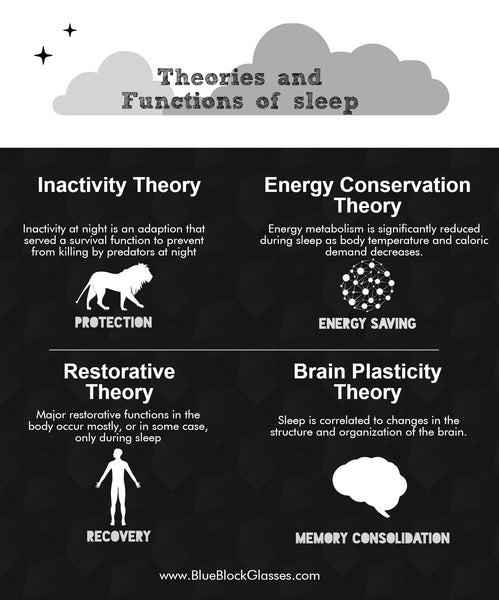Sleep 101 : Why Do We Sleep?
Posted by Blue Block Glasses Team on October 13, 2016 . 0 Comments
If you sleep for about 8 hours per night, it means you will spend approximately 229,961 hours or 26.2 years of your life asleep! That is very a long time. Yet if you ask people a basic question: why do you sleep? you probably won’t get a satisfactory answer. This article is part of a series called “Sleep 101” that aims to answer some common questions people have about sleep.
What are the benefits of sleep?
To understand the purpose of sleep, we start by looking at it's function and the underlying biological changes that occur during sleep.
What is the function of sleep?
Although we are still not exactly sure why we sleep there are a few main theories that are supported within the scientific and medical communities.
A key function associated with sleep is Memory Consolidation, which refers to the formation of long-term memories as we sleep [1]. As neurons build connections with other parts of the brain from the acquisition of new information from new experiences, sleep is the period during which the important connections are strengthened and unimportant connections pruned [2]. As a result, the brain continuously turns important short-term memories to long-term ones.
The Recovery theory of sleep states that a key function of sleep is to allow for physiological improvements. Many major restorative functions take place or peak during sleep hours, such as: muscle growth, tissue repair, protein synthesis and growth hormone release. Sleep also provides an opportunity for the body to repair the cell damage which cannot occur during the day due to risk of exposure to harmful UV rays from the sun [1].
Energy regulation is another important function of sleep. As the body temperature and caloric demand decreases when people fall asleep, energy demand and expenditure is significantly reduced during sleep [1].

What are some of the other benefits of sleep?
Lastly, based on personal experience, we know that a restful sleep can be a excellent preparation for the following day, which in turn impacts many areas of our life - physical feeling, mood, and cognitive function. With enough sleep, people tend to be happier and more energetic [3].
What happens if we don’t sleep enough?
Many studies have been completed to assess the impacts of sleep deprivation. The following paragraphs provide an overview. Firstly, a lack of sleep impairs memory and reduces cognitive abilities. Over time, mood and behavior are adversely affected too [4]. Many studies have shown that a lack of sleep is usually associated with long-term health consequences. We know that sleep deprivation results in an immune system response and over time – this could increase the risk of heart disease, stroke and other medical conditions [2].
Furthermore, sleep deprivation has pronounced negative effect on learning and performance. Several studies have shown that it is very difficult for sleep-deprived people to process external information while memory and recall functions also decline. For instance, sleep deprivation plays a crucial role in many serious accidents, such as late night car crashes or lapses in medical judgement [5].
Sleep deprivation negatively impacts our ability to focus and perform high-level cognitive functions. A major consequence of this is that effects of sleep deprivation may be felt by employers- statistics indicate that insomnia costs U.S workforce $63 Billion annually in lost productivity.
In conclusion, sleep is a vital component of many daily functions such as performance and focus, and over time has the ability to strong influence overall health.
by Ariel Wang
Reference:
[1] Sleepdex. Why We Sleep. http://www.sleepdex.org/sleep.htm
[2] Ghosh, P. Why do we sleep? Science & Environment, BBC News/http://www.bbc.com/news/science-environment-32606341/ 2015
[3] Harvard Medical School. Benefit of Sleep. Why Sleep Matters/ http://healthysleep.med.harvard.edu/healthy/matters/benefits-of-sleep/why-do-we-sleep /2007
[4] Purves, D; Augustne, GJ; Fitzpatrick D; et al. Why DO Humans and Many Other Animals Sleep? Neuroscience/ https://www.ncbi.nlm.nih.gov/books/NBK11108/ 2001
[5] Harvard Medical School. Sleep, Performance, and Public Safety. Why Sleep Matters/ http://healthysleep.med.harvard.edu/healthy/matters/benefits-of-sleep/why-do-we-sleep /2007

Post Comment.